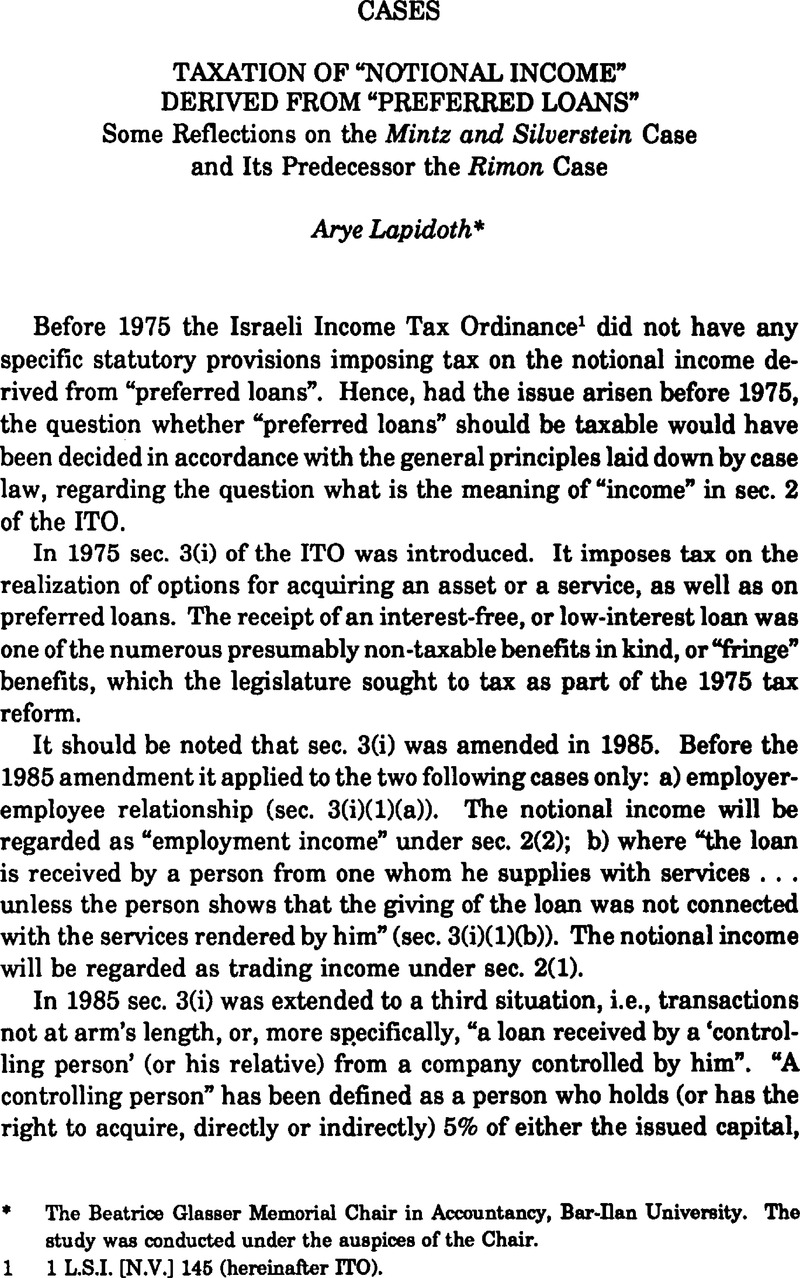Article contents
Taxation of “Notional Income” Derived from “Preferred Loans”
Published online by Cambridge University Press: 04 July 2014
Abstract

- Type
- Cases
- Information
- Copyright
- Copyright © Cambridge University Press and The Faculty of Law, The Hebrew University of Jerusalem 1994
References
1 L.S.I. [N.V.] 146 (hereinafter ITO).
2 (1992) 46(i) P.D 573.
3 (1993) 21 P.D.E. 345.
4 Yoran, A., “Double Taxation or Notional Expenses”, (1992) vol. 6, no. 2 Missim, p. A–1Google Scholar; Edrei, Y., “Tax Consequences of Low Interest Loan”, (1987) 12 Iyunei Miahpat 145Google Scholar; Alter, A., “The Taxation of Notional Incomes and Notional Expenses”, (1992) vol. 6, no. 3 Miseim p. A–8Google Scholar; B. Nahir, “Notional Income — Double Taxation”, Ibid., p. A-14; Lapidata, A., “The Consideration of Domestic Double Taxation in Interpreting ‘Preferred Loan’ Legislation and the Scope of the ‘Purposive Interpretation’ — Some Reflections on the Rimon Case”, (1994) Int'l Tax R. 4Google Scholar; Margallot, Y., “Section 2 of the Income Tax Ordinance as a Source for Taxing ‘Notional’ Incomes (in Light of the Rimon and Mintz and Silverstein Cases)”, (1993) vol. 7, no. 6, Missim, p. A–63.Google Scholar [All the above articles (except the one by A. Lapidoth) are in Hebrew.]
5 Income Tax Appeal 84/84 (1986–87) 13 P.D.E. 143, at 148.
6 Kibbutz Hatzor v. Assessing Officer, (1986) 39(ii) P.D. 70, at 77.
7 Rimon, supra n. 2, at 583.
8 The argument of “notional expense” is discussed extensively in A. Yoran, “Double Taxation or Notional Expense”, supra n. 4. A similar idea is expressed by Y. Edrei, “Tax Consequences of Low Interest Loan”, supra n. 4.
On the other hand, an opinion has been expressed that sec. 3(i) will apply only where there is no barter: A. Alter, “The Taxation of Notional Incomes and Notional Expenses”, supra n. 4. See also B. Nahir, “Notional Income — Double Taxation”, supra n. 4. Nahir criticizes the Rimon decision, preferring the decision of the District Court. As to “notional expenses”, he notes, inter alia, that their allowance may lead to frustration of the intention of the Legislature in sec. 3(i). See also Y. Margaliot, “Section 2 of the Income Tax Ordinance as a Source for Taxing “Notional” Incomes”, supra n. 4.
9 72 T.C. (1979), 931, at 947.
10 It may be interesting to compare the Israeli approach with the British: see Wolf, Lord, “Tax and Judicial Review”, [1993] B.T.R. 219.Google Scholar
- 1
- Cited by




